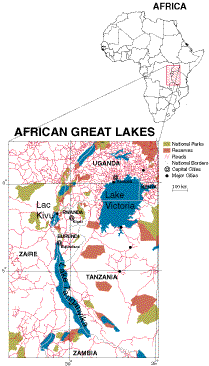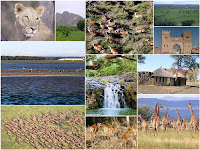Can The Great Lakes Region Settle Down?
 Since the brutal assassination of Patrice Lumumba and through the dictatorship of the Western supported Mobutu in the DRC; through all the brutal and bloody regimes and wars that Uganda has seen; and though the many of the senseless mass killings and vendettas between the Hutus and Tutsis - the Great Lakes region of Africa: Uganda, the DRC, Rwanda and Burundi - has been the most unstable in Africa and one of the most conflict prone in the World.
Since the brutal assassination of Patrice Lumumba and through the dictatorship of the Western supported Mobutu in the DRC; through all the brutal and bloody regimes and wars that Uganda has seen; and though the many of the senseless mass killings and vendettas between the Hutus and Tutsis - the Great Lakes region of Africa: Uganda, the DRC, Rwanda and Burundi - has been the most unstable in Africa and one of the most conflict prone in the World.What has made the region even more unstable and cost the lives of millions of people, the worse being the Rwandan genocide of 1994, is outside and foreign interference in there. Because of its vast and varied natural resources, foreign powers, especially from Europe - have, most times, not helped in allowing the region to have a long lasting peace. It's this interference that lead to the long and unwavering support for the dictator - Mobutu - after he had tortured and slayed Patrice Lumumba; after he continued to allow the looting, plunder and keeping of the DRC (then Zaire), undeveloped and backwards. It's this interference that destabilized Uganda, by first foreign powers, Britain in particular - supporting Idi Amin's taking over Uganda and then supporting his removal by force. And, it's this foreign interference, especially by the Belgians - that greatly influenced the animosity between the Hutus and Tutsis of Rwanda and Burundi; influencing both the mass killings in 1972, in Burundi, where thousands of Hutus were killed by Tutsis; and the mass slaughter, by Hutus, of almost a million Tutsis and moderate Hutus in Rwanda, in 1994.
It's still the same today; actually, the Great Lakes region seems more unstable now than it was ever before. With the Tutsi Laurent Nkunda and his rebels advancing deeper and deeper in to the DRC; with the Mayi Mayi still strongly entrenched in the DRC; and with neighboring and foreign countries interfering much more than they are helping - the region will see only more conflicts. And more suffering and misery for its people. Can the region have a long and lasting peace?
It can: only if neighboring countries and foreign powers honestly and truly help, instead of being after the vast resources of the region. It can: if the UN, international and regional organizations focus more on the region and try to properly fix the root causes of the conflict, especially between the Hutus and Tutsis. It can: if the right political strategy is used by those trying to help. It makes no sense, now, for Germany and France to stir things up when they could be more helpful and useful diplomatically.
And: it would be most helpful, if America's President Elect, Mr. Barack Obama, can later give some of his time and wisdom to the Great Lakes region. As occupied and busy as he would be with huge American problems, Mr. Obama would have done one of the best things in and for Africa if he can help in resolving the disputes that have consumed the region for so long and made millions, including - children, women, the elderly and weak - to die or suffer and live in despair and fear for so long. If Mr. Obama can give priority to achieving a long lasting peace for the region and succeeds, he would indeed have given Africa one of the best and greatest gifts of all.


